The well known quote by Benjamin Franklin quote depicts the meaning of Compounding when it comes to investment.

“Money makes money. And the money that money makes, makes money”
Often there is a misconception among investors that they need substantial investment to build wealth. However, this is not true. If you invest in small tranches but consistently, you can build wealth over time with the power of compounding.
Here, we will take a closer look into how the compounding effect works and how it can benefit you to build wealth.
What Is the Compounding Effect?
Compounding occurs when you earn interest not just on your original investment but also on the interest it has already generated. Over time, this results in a snowball effect, helping you multiply growth.

The longer you keep your funds invested, the better the impact, as you earn ‘interest on interest’ continuously.
The compound interest formula helps you figure out how much money you’ll have in the future based on these four things.
Suppose you invest ₹10,000 at an annual interest rate of 8%, compounded quarterly, for 5 years.
Here:
P=10,000
r=0.08 (8% annual interest rate)
n=4 (since interest is compounded quarterly)
t=5 years
Now, you add these values into the formula and you will get: A="10,000
So, after 5 years, your investment would grow to approximately ₹14,693. The compound interest earned would be ₹4,693.
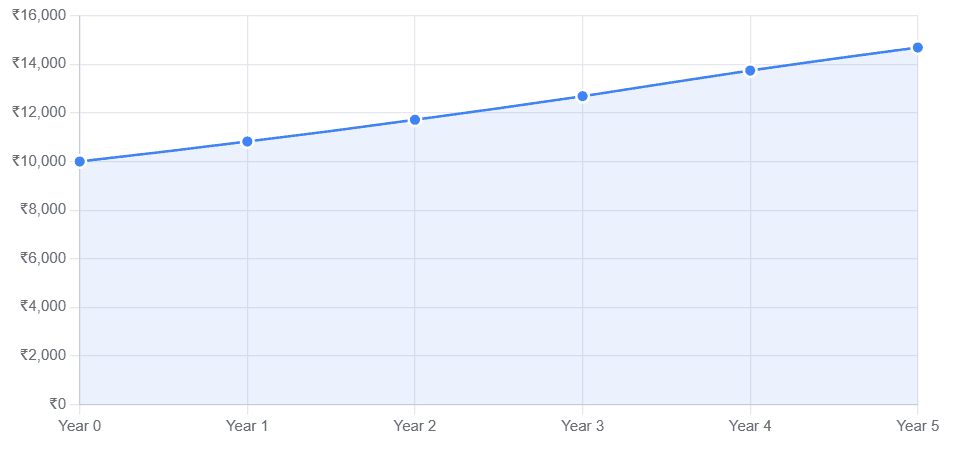
How Compounding Effect Build Wealth?
To take advantage of the compounding effect, starting your investment journey at an early age is the key. The sooner you begin, the more time your funds have to grow.
1. The Impact of Time on Compound Interest
Compounding works best when you stay invested for a long time without withdrawing your returns. The longer your funds stay invested, the more it grows because compounding increases over time.
A longer investment period means time is on your side, helping your investments earn more interest. Let’s look at an example to see how compounding can boost your wealth.
Consider two individuals, Rahul and Amit, both aiming to retire at 60:
Rahul: Begins investing ₹5,000 monthly at age 25 and continues until he turns 35, totalling 10 years of contributions. He then stops adding new funds but leaves his investment to grow until retirement.
Amit: Starts investing ₹5,000 monthly at age 35 and continues until he turns 60, totalling 25 years of contributions.
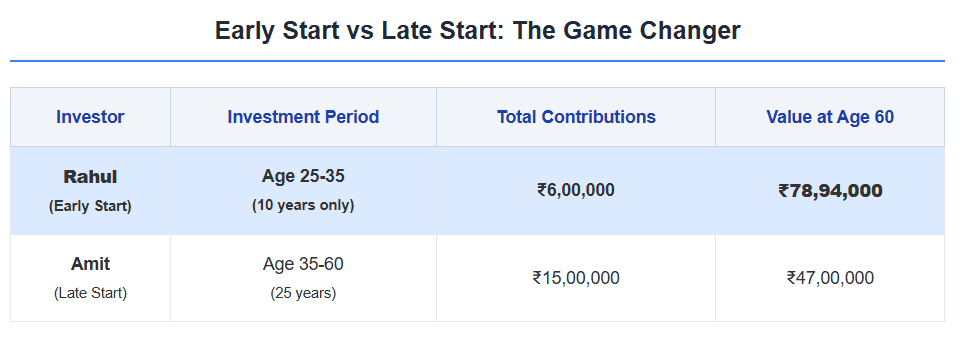

Despite investing for a shorter period and contributing less money, Rahul's early start allows his investment to benefit from compounding over a longer duration, resulting in a larger retirement corpus compared to Amit.
2. Developing Financial Discipline
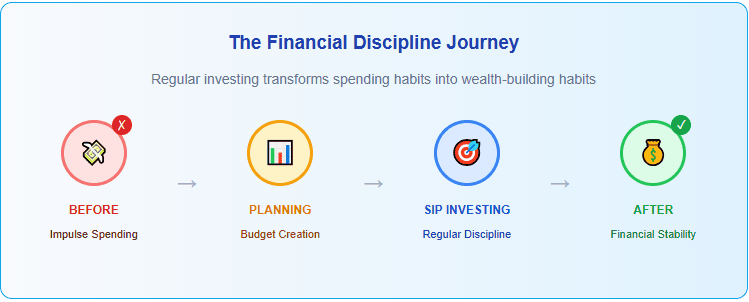
Starting to invest early not only grows your wealth but also helps you develop good money habits.
When you regularly set aside money for investments, you learn to prioritize saving over unnecessary spending. This practice encourages you to budget wisely, ensuring that you live within your means and focus on what's essential.
For this, you can also use Systematic Investment Plans (SIPs) in mutual funds based on your individual preferences. SIPs help invest regularly and provide the added benefit of compounding as your return earns return over the period of investment.
Over time, this consistent approach to managing your finances becomes a habit, leading to better financial stability.
3. Mitigating the Impact of Inflation
Inflation is a hidden tax on your income. It reduces the value of money over time. For example, if something costs ₹100 today, it might cost ₹105 next year if inflation is 5%. That means the same ₹100 won't buy the same thing after one year.
If you start investing early, your money has more time to compound and possibly beat inflation.
However, here your choice of investment also matters. For example, equity investments can yield better returns compared to debt investments. You need to choose an investment instrument based on your goals and risk appetite.
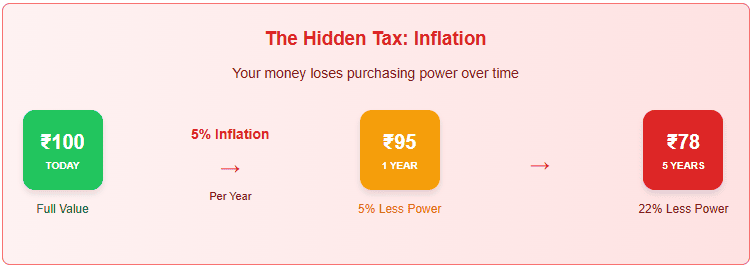
Tips to Maximize the Compounding Benefit
Maximizing the benefits of compounding requires a strategic approach to investing. Here are key strategies you can consider:
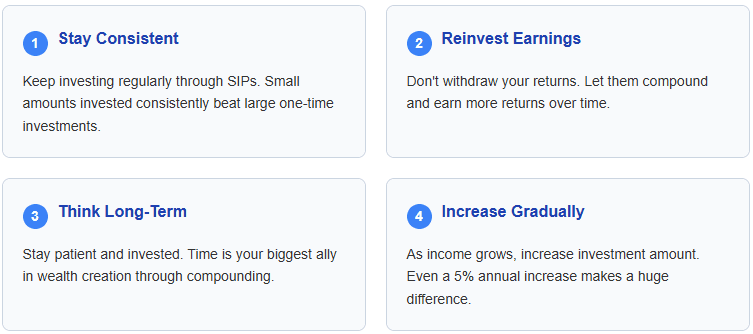
1. Stay Consistent
Keep investing regularly, whether it's every month or every year. When you invest small amounts constantly, you don’t have to worry about market ups and downs. Over time, this habit helps grow your wealth steadily.
2. Reinvest Your Earnings
Whenever you earn interest or dividends from your investments, don’t withdraw them — reinvest them. This way, your money earns money and grows big over time.
3. Think Long-Term
The longer you stay invested, the better your returns. Even if markets fluctuate, staying patient allows your money to grow your capital in the long run. Time is the key to making compounding work for you.
Let’s take an example. Person A and Person B invested Rs. 1 lakh in 2025 for 10 years and 20 years, respectively. If the rate of return is 10%, the investment amount for Person A in 2035 would be Rs. 2.59 lakh. For Person B, in 2045, it would be Rs. 6.73 lakh. This showcases the impact of staying invested for the long term and how it boosts up the compounding effect.
4. Increase Investments Gradually
As your income grows, try to invest a little more each time. Even a small increase in your investment amount can make a huge difference over many years. For example, as your salary increases every year, increase the investment amount by a certain %.
So, if your salary increases by 10%, you can increase your annual investment amount by 5%. That depends on your preferences and goals.
Conclusion
Compounding helps you build wealth over time. Even small, regular investments can turn into a large corpus if given enough time. The key is to start early, stay consistent, and let your money grow.
As Albert Einstein famously said:



